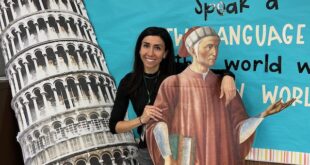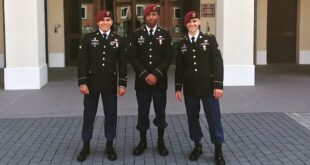Prior to arriving at Highland Park High School two years ago, Maria Barbanente had already blazed a trail where life’s adventures had added depth to her linguistic skills. The daughter of native Italians from the Puglia region, Barbanente had a master’s degree in education, and a certification in Spanish, by the time she arrived in Madrid, Spain to teach English for two years.
It was hardly her first time in Europe. “Learning the Italian language and having been fortunate enough to travel to Italy every summer as a child, I was able to further explore the Italian culture and build relationships with family members and friends,” recalls Barbanente, a Chicago native. She also studied in Rome for a semester as a college junior.
And in her fist year of teaching full-time at Trinity High School in River Forest, “I took 18 girls on an educational tour of Italy,” she says. “It was the first time many of them had ever left the country and was truly an eye-opening experience for them. Several students went on in college to study in Italy.”
It’s safe to say that 10 years after that 2006 trip, Barbanente continues to have the same positive influence on her charges—and will once again make a difference once school’s back in session. She expects to teach about 120 students in a variety of courses including Italian 1, Italian 2, Italian 3-4 combined, and Spanish 2.
The Italian program at Highland Park High School approaches language learning from a number of angles. For starters, an Italian Club gives students a chance to broaden their horizons—both within school and across an ocean.
 “Joining the Italian club is a great way for students indulge in more Italian culture outside of class—and connect with other students outside of their own Italian class,” Barbanente says. “We play Italian games such as tombola or Italian card games, we eat Italian food and listen to Italian music.”
“Joining the Italian club is a great way for students indulge in more Italian culture outside of class—and connect with other students outside of their own Italian class,” Barbanente says. “We play Italian games such as tombola or Italian card games, we eat Italian food and listen to Italian music.”
HPHS also has an Italian Honor Society induction ceremony near the end of the school year where high-achieving students are recognized and their parents invited.
Barbanente looks forward to watching, over time, groups of new Italian students work four years to become skilled speakers and readers. It’s her mission to not just teach the language, but also engender a passion befitting of Italian culture and history.
“My goal is to build and strengthen the program over time,” she says. “My level 1 enrollment this past year consisted of predominantly freshman, and that points to great potential for program longevity.”
Barbanente adds that she’s excited “that most of my Italian 2 students will soon be Italian 3 students—and I hope that they will stay the course through level 4. I’m also looking forward to teaching the younger siblings of many of my current or former students.”
Coming back this fall, she’ll have a full had of steam and another adventure under her belt. This summer she studied in Siena, Italy under Prof. Suzanne Branciforte, author of the Italian textbook “Parliamo Italiano!“
Is it a challenging profession to teach Italian to teens? Challenging, yes—but hardly just a profession.
“I never viewed teaching Italian as simply a job,” Barbanente stresses. “As an Italian teacher I feel I’m acting as an ambassador for the country of my heritage, its culture and its endless treasures to be discovered.
 Fra Noi Embrace Your Inner Italian
Fra Noi Embrace Your Inner Italian







